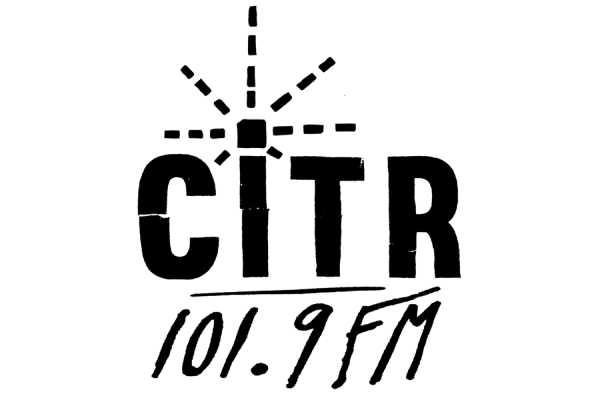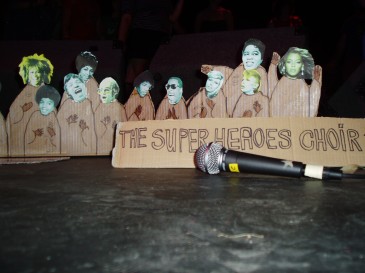How Soon is Yesterday?
the floor
In light of the current explosion of new wave rip-off artists, it should be easy to make fun of The Floor with their Morrissey-quoting website and echo pedal love affair. Unfortunately for the cynic within, the Edmonton quartet’s first LP, Personnel, is stunningly good. Tendonsnapping guitars, sweeping synth, and anthemic insistency are laid under a heavy dose of effects to make a sound that was born under New Wave but grew up with britrock. Of course, the band wants to drop comparisons to the first wavers and their most fashionable ripples, but they’ll have to give up writing songs about girls on film first. DiSCORDER spoke to Graham Lessard, The Floor’s synth/guitarist, from various locations across Canada.
DiSCORDER: The Floor began as a noise band. How are these origins reflected in your music?
Graham Lessard: The infl uence of shoegazers like MBV and Ride is more pronounced on Personnel than either of our previous releases, as evident in the feedback and chaotic guitar textures that are layered in a number of songs on the new album. The great post-punk bands were hugely important to the late 80s/early 90s shoegazers, and the best groups of both genres share the same pop sensibilities. We’ve always been big into the atmospheric, noisy stuff
but I think we’ve incorporated it into our own writing more as we’ve gone along, partly in order to further distance The Floor from a lot of third rate ‘new new wave’ fashion rockers that seem to spring up everywhere you turn these days.
Do you see The Floor as new new wave?
How about ‘old new wave’? Some might disagree or say I’m just a snob, but I think we have a very specific sound: post-punk in a strictly British vein. As for the atmospheric elements you mentioned, even early post-punk groups were experimenting with noise and textures that the shoegazers would later expand on (for instance, Modern Eon’s Fiction Tales or the Comsat Angels’ Sleep No More). No disrespect intended though—there are several good groups that
get lumped in with the NNW crowd, but I’ve never felt much affinity with them musically speaking. Plus we’re not overtly fashionable—not even a single white belt between the four of us.
A lot of truly old New Wavers, like Martha and the Muffins, the Chameleons, have regrouped for reunion shows and revival albums within the last few years. Do you feel that the interest in bands like the Faint or the Killers have rekindled interest in the ‘old new waver’ sound or do you feel it’s the other way around?
I guess it’s the 20 year cycle—what’s old is new again. Echo & the Bunnymen had a reunion tour in 2001, before the Interpol album really sent the ‘new new wave’ trend into fever pitch. But then again it’s hard to imagine so many Joy Division records suddenly flying off the shelves if reference to JD hadn’t made it into every single review of Bright Lights to ever make print. That’s all speculative, but it’s clear that music press and fans are far more conscious of musical
history and influences than ever before. Perhaps to the point where the focus is too much on a band’s debt to their influences and not enough on the music they produce. Honestly, in the 1980s there were good post-punk bands and not so good; at present there are good new new wave bands and bad ones, and the difference in a lot of cases seems glaringly obvious. Interesting discussion in some ways, although it’s sort of an academic problem—if a group is releasing shit-hot records I don’t see why anyone gives a toss where they draw their inspiration from.
And if there wasn’t a crack at the white belt at every turn… How do you make music in a strictly British vein out of Edmonton?
I guess that growing up in a city where the music scene was overwhelmingly (alt) country, roots, or punk, English art-rock was about as contrary as you could get. I think it is still a point of vital importance for The Floor to write music that is completely different from what people would expect for a band from the Canadian prairies.
I guess if you’re making music and you’re Canadian, it’s Canadian music no matter what it sounds like. That’s the Can Con rule we live and die by here at CiTR. I read that your very first performance as The Floor was on college radio. How did that come about?
Matt [Pahl, vocals and guitar] and I wrote and recorded a song in the summer of 2002 and submitted it to CJSR (University of Alberta campus radio) for a compilation they were putting together. We didn’t even think twice about it. A few weeks went by and Matt invited me to play a few times with his band. They had formerly been called The Politburo, but at that time they had just gone through a couple of drummers and were trying to play with the bass player,
Dan Carlyle, on the drums, and second guitarist Paul Amusch on the bass. Then the radio station called and said they had picked the song (called “Warning Sign”’, a re-recorded version is on our first EP) for the comp, and asked us to play the release party in a couple of weeks, which would also be aired live on the station.
From The Politburo to The Floor —that’s a pretty drastic letdown. Why the name change?
Ouch…the kind of music we were writing was more focused and very different sounding than The Politburo, and the name change was in order to reflect that…[The Floor] is just a simple name that looks good in capitals.
That heavy hazy synth sound adds a pretty grand dimension to the music. Do you think your latecomer contribution of synthesiser changed the direction of the band musically?
It wasn’t quite like bringing in the synth and suddenly The Floor’s sound changed drastically—it was a very considered move to use synth. The synth is usually to add ‘dimension,’ as you say, rather than as a focal point. But I spend hours working on synth sounds and parts. As far as the synth goes, I spend as much time listening to Kraftwerk and Yellow Magic Orchestra as I do to guitar-based bands like the Cure and the Chameleons.
The eerie sound of Personnel pairs so nicely with the lyrics’ preocccupation with privacy and detachment. Did you intend to make a concept record?
Not as such, although Matt is very intent on writing lyrics that fit the sound of our songs. He would be the first to tell you that the lyrics are not part of any grand design. They are partly ‘accompaniment’ to the instruments (because most of the bands we are influenced by write songs with vocals) and partly an honest observation of the world around him.
Where does the “personnel” sample from the title track’s chorus come from?
It’s a heavily affected recording of Matt’s voice. Another interesting bit about that one—the crash sound at the beginning is also an original recording. Matt and I spent an afternoon recording the sound of various glass objects smashing in a garbage can filled with bricks.
What was behind that sonic project? Seems like a lot of effort for a single crash.
No grand scheme—we wanted an original sound effect instead of a pre-recorded sample. And how much inspiration do you need for an afternoon of violently destroying a pile of glass bottles and light fixtures? It’s just plain fun. Recording that sound is very representative of the work ethic we adhered to for the making of Personnel. No corners were cut. We did as many takes as necessary to get the best performances out of everyone—in a couple of cases we recorded all the tracks (often 20-30) for entire songs two or three times in order to get things sounding just right.
So, you just wrapped up the cross-Canada tour extravaganza that brought you to Vancouver in June. Seeing as we’re practically neighbours on the national scale of things, can The Floor be expected in town anytime soon?
Nothing slated for the immediate future—we’ll keep you posted.
The Floor’s new album Personnel is released on Normals Welcome
Records and is available virtually through
www.nrmlswlcmrcrds.com.



